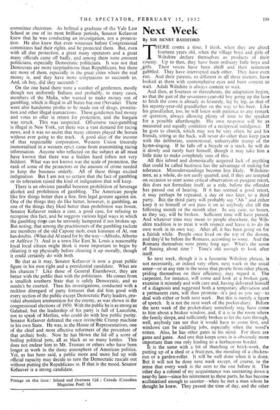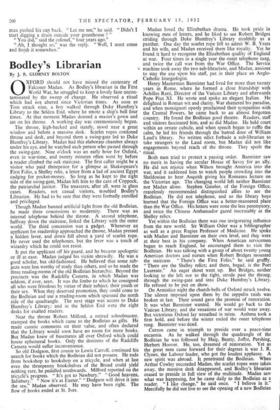Next Week
By SIR HENRY BASHFORD
THERE comes a time, I think, when they are about fourteen years old, when the village boys and girls of Wiltshire declare themselves as products of their county. Up to then, they have been ordinary little boys and girls. Their voices have been shrill and their sentences gabbled. They have interrupted each other. They have even run. And their parents, so different in all these matters, have looked at them with contemplative eyes and been content to wait. Adult Wiltshire is always content to wait.
And then, at fourteen or thereabouts, the adaptation begins, so that the gait of the seventeen-year-old boy going up the lane to fetch the cows is already as leisurely, leg by leg, as that of his seyenty-year-old grandfather on the way to his beer. Like his grandfather, too, he will listen with patience to any remark or question, always allowing plenty of time to the speaker for a possible afterthought. His own response will be as measured and equally confident of a reciprocal indulgence. It he goes to church, which may not be very often, he and his friends, sitting at the back, will never do other than keep pace with the deliberate, unemotional, unhurryable tramp of the hymn-singing. If he falls off a bicycle or a stack, he will do it slowly and rarely hurt himself, though it may take him a little time to make completely sure of this.
All this inbred and domestically acquired lack of anything that could be called hastiness has the advantage of making for tolerance. Misunderstandings become less likely. Wiltshire- men, as a whole, do not easily quarrel, and, if they are tempted on occasion to utter some critical observation or pungent retort, this does not formulate itself, as a rule, before the offender has passed out of hearing. If it has seemed a good retort, it may perhaps be repeated, a day or two later, to a third party. But the third party will probably say "Ah " and either keep it to himself or not pass it on to anybody else till the following month or the month after. In any case, no bones, as they say, will be broken. Sufficient time will have passed. And whatever time may mean to people elsewhere, the Wilt- shire tradition is to treat it with respect and leave it to do its own work in its own way. After all, it has been going on for a fairish while. People once lived on the top of the downs, and they'd be before the Romans, according to some. And the Romans themselves were pretty long ago. What's the sense of fussing_ about time ? Time's old enough to look after itself.
So next week, though it is a favourite Wiltshire phrase, is not necessarily, or indeed very often, next week in the usual sense—or at any rate in the sense that people from other places, priding themselves on their efficiency, may regard it. Tho carpenter, for instance, will come and look at a broken gate, examine it.minutely and with care and, having delivered himself of a diagnosis and suggested both a temporary alleviation and a permanent cure, will then promise—it's just as you say—to deal with either or both next week. But this is merely a figure of speech. It is not the next week of the pocket-diary. Before the next week of the pocket-diary somebody may have come to him about a broken window, and, if it is in the room where the family sleeps, and sufficiently broken to let the rain through. well, anybody can see that it would have to come first, and windows can be caddling jobs, especially when the wood's rotten. Also, he has other gates in his mind. For there are gates and gates. And one that keeps cows in is obviously more important than one only leading to a herbaceous border. It is the same with a bit of thatching or brick-work, the putting up of a shed or a fruit-pen, the mending of a chicken- run or a garden-roller. It will be well done when it is done. But it will not be done next week except, of course, in the sense that every week is the next to the one before it. The other day a colonel of my acquaintance was sauntering down.a near-by lane—since his retirement to these parts, he has become acclimatised enough to saunter—when he met a man whom he thought he knew. They passed the time of day, and the other man pushed his cap back. " Let me see," he said. " Didn't I start digging a drain outside your greenhouse ? "
" You did," said the colonel, " four years ago."
" Ah, I thought so," was the reply. " Well, I must come and finish it somewhen."



























 Previous page
Previous page